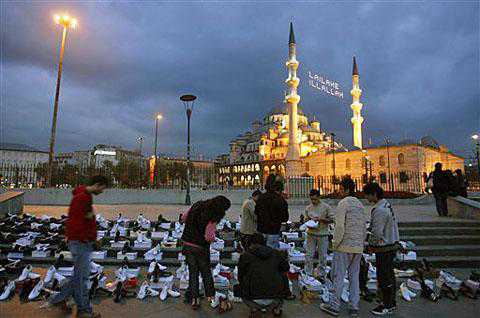Agustos 12, 2008 tarihli bir TDN makalesi: Ilginize
Tuesday, August 12, 2008
While Iraq is in great pain because our eastern neighbor has decided to follow Saddam’s path to nihilism, our northern neighbor extends a hopeful hand of friendship, trust and promising prosperity
A historic visit:
We know this historic visit was the fruit of good efforts of both President Jalal Talabani and Prime Minister Nori al Maliki. It came after the obvious success on the ground of the latest military/security operations in different places in Basrah, Baghdad, Ramadi, Mosul and elsewhere where criminal gangs used to terrorize the civilians.
The visit of Erdoğan could not possibly take place without this security success. The writer of this article is a witness to this improvement through a number of tours and walks during the day and night in Baghdad. In Abu Nawas, the famous Baghdadi avenue with cafes and restaurants on the bank of the River Tigris, universally known for its mesguf, or grilled fish, I was very surprised to see hundreds of families out there. A private security company, The Sandi Group, is in charge of the security of the place, checking cars, watching for terrorists and keeping order.
Turkey is a semi-European country with its democratically elected parliament; free, independent and critical media; active and genuine civil society organizations; and the progress it has made in the fields of agriculture, industry, education, tourism or services. All of this and more shall help to create a unique regional cooperation between Turkey and our country, which has the largest oil reserve in the world and the best human resources in the Middle East. Yet, due to the long decades of dictatorship under which we wasted our national wealth on armaments, the liberation of Palestine, lies of propaganda and other destructive practices, our country is almost a wasteland. This is a sad reality but must be changed. To change it we need this kind of strategic regional cooperation to put energies together to rebuild and reconstruct.
The Kurdish element:
Along the Iraqi-Turkish border, the Kurdish people live. This existence could be of a great help and serve as the bridge between Turkey and Iraq. The armed insurgency must come to an end and people must follow civilized practices and methods to express themselves, demand rights and demonstrate grievances. The State is not innocent and policies must be revised. And people listened to and cared for.
The Turkomen in Iraq and Arabs in Turkey are other examples that diversity could and should be an element for strength and wealth.
While Iraq is in great pain because our eastern neighbor has decided to follow Saddam’s path to nihilism, our northern neighbor extends a hopeful hand of friendship, trust and promising prosperity.
Basrah-Istanbul railway system:
Here I come up with my proposal to both governments of Iraq and Turkey: Put as a top priority to run a most technologically modern and monumental railway between Basrah and Istanbul. And then a very modern highway for transport trucks and personal cars to connect Basrah to Istanbul. These two giant projects will attract large companies to invest while small businesses will flourish along the rail and the highway.
In this way, Iraq will be linked to Europe via Istanbul and Turkey will be linked to the Gulf via Basrah.
One does not need more than a glance to realize what a creation of wealth this should bring to the people of the two countries and for beyond — the Gulf and Europe.
In our globalized world we need more tolerancy diplomacy. This new approach and concept means to find out common grounds according to mutual benefits regardless of differences in faiths, ideologies, ethnic or linguistic backgrounds. Iraq and Turkey and other states should explore the benefits of the acceptance of each other and recognition of each other’s rights. This is an application of the The Turkish-Iraqi High Strategic Cooperation to set an example for many others who are crippled by the evils of ideology.
………
Hussain Sinjari is an Iraqi commentator based in Baghdad and the president of Tolerancy International. (www.tolerancy.org)
© 2005 Dogan Daily News Inc. www.turkishdailynews.com.tr


